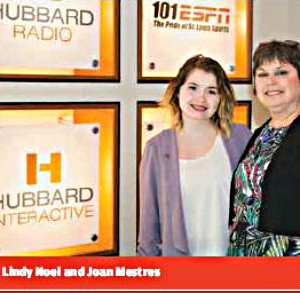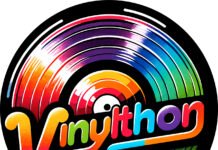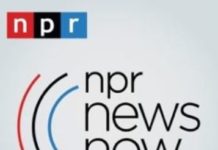
Joan Mestres is a senior marketing consultant for Hubbard Interactive in St. Louis, and she decided that running PSA’s for a local charity just wasn’t enough. She got creative, stayed persistent, and created several ideas for the Greater Missouri Chapter of the Alzheimer’s Association. Not only did her ideas increase awareness and raise funds for the organization, they produced revenue for the radio station. A win-win for everyone! We spoke to Joan and the communication and marketing coordinator for the Alzheimer’s Association Greater Missouri Chapter, Lindy Noel.
RI: How did you come across the radio stations and meet up with Joan?
Noel: Joan reached out to me and said she had a connection to Alzheimer’s and wanted to work with us. I remember meeting with her, and she seemed so excited about the opportunity to work with us. Her passion really came through.
We worked together a little bit over the first few years, but we didn’t have much budget. We are not-for-profit, so we are very mindful of the dollars we receive from donors, and we are cognizant of how we allocate those dollars. Advertising at the time was a little bit hard to do because of our budgeting. Over the last couple of years, we increased that, and that’s when we reached back out to Joan.
The fact that they now have a personality on air who also has a personal connection with the disease, and is extremely passionate about our organization and fighting Alzheimer’s, increased our desire to work with their radio station.
RI: Joan, why did you approach the organization?
Mestres: Sadly, my mother-in-law developed Alzheimer’s and did pass away from it. That was the first time I was really introduced to it. I did know one other person who passed away at a young age from the disease, so I was aware of the charity and knew about the walk they did. When I reached out to Lindy, I wanted to see what we could do as a station because we run PSA’s and do a lot of things where we get deeply involved in our community. That’s how it initially developed.
RI: How difficult is it to approach a not-for-profit and get them to buy advertis- ing?
Mestres: I knew some charities had small budgets, but that doesn’t matter because it’s important to me to give back to the community and get involved in things I feel a connection to. I reached out and said we have PSAs we can run, but I also asked if they had an advertising budget where they could at least promote the Walk to End Alzheimer’s. I said, “Tell me what you have, and I’ll make the most of it for you.”
RI: Lindy, I know sometimes you spend some money, and that could mean more donations coming in. You probably have to walk a tightrope there.
Noel: For us, we set our budget ahead of time. We have a strict fiscal year and our budget stays pretty much the same. However, we do occasionally get someone who makes a donation and says they want it to go toward marketing and advertising to increase awareness.
When that does happen, we look at, first, what the donor wants to accomplish and how we can be most effective with those dollars. When that’s the case, we do reach out to our account reps and say, “This is our goal. How can you help us maximize that goal?”
That’s one thing I’ve found that Joan and the Hubbard team at 106.5 The Arch [WARH/ St. Louis] have been great about. We tell them the budget, but we also tell them our goal. Joan has been fabulous at maximizing the budget and exceeding our expectations as a client.
I remember one of the first meetings we had with her. We told her the budget, and she asked what we wanted to achieve. That felt to me like she cared. Sometimes when you do have an ad budget, an account rep just sees dollars and they don’t see the goal. Joan was not like that. She was adamant about finding out what we wanted to accomplish and what ideas we had. She contributed ideas as well, and they are coming to fruition, which is exciting to see. We are getting more than ads. We are getting awareness.
RI: How are you using radio, and how do you know it’s working for you?
Noel: We are doing a little bit of everything. We’re doing a lot of spots with the radio personality in the morning show who has a connection to the disease. He’s sharing his personal connection so heavily that we get e-mails about it. When we are out in the community, we hear people say, “I heard Spencer talking about his connection to Alzheimer’s and the Walk to End Alzheimer’s in St. Louis.” That’s how we know it’s working — because people are coming to us saying, “We heard Spencer mention you on air.”
We’re doing some digital components as well. We’re getting some cool digital ads on the station website. And they put together this beautiful piece called “A Road of Memories.” It’s a digital donation platform. If people donate to the radio station’s Walk to End Alzheimer’s team, they can honor a loved one with that donation. Then the station puts that memoriam onto a virtual brick road.
People can indicate what color brick they want, and that’s a symbol of the flowers we have on our walk. We have different-colored pinwheel flowers, and each is representative of what someone might be facing or what their position is when facing Alzheimer’s.
For example, a blue flower means you’re living with the disease or some form of dementia. Purple means you’ve lost someone to the disease. Orange means you support the cause and the vision; maybe you don’t necessarily have a connection, but you know that this fight is necessary. Yellow means you’re supporting or caring for someone with Alzheimer’s.
Joan came up with the idea to take those colors from the flowers and move them into a virtual brick road. That shows me that we’re not just buying ads, we’ve formed this beautiful relationship with Joan, 106.5, and with the morning show host, Spencer. We’re getting a lot more than we are paying for.
RI: Joan, can you talk more about Spencer Graves and how he got involved?
Mestres: Spencer Graves is the host of our morning show, Spencer’s Neighborhood, on 106.5 The Arch. He happened to mention on the air one time that his mother suffered from Alzheimer’s. I asked him to get involved with us, and then Lindy and her team reached out to him to MC their walks and other events. He brings up topics on the air from his personal life, and he does talk about this with his mother quite a bit. His father is the caregiver, and ironically, now, his father runs nursing homes that provide care for Alzheimer’s patients.
With this great connection and passion that Spencer had when I met with Lindy and her team, we talked about channeling that and using personal endorsements with Spencer, which was great, but that was just morning drive.
I asked Lindy and her team to find people who were patients or caregivers and bring them in to record messages. We created a vignette-type spot where Spencer opens, Lindy’s people do a portion, and Spencer ends it reminding people to join us for the walk. We have a true partnership. That’s our goal, to have a lasting partnership and ultimately nd a cure for Alzheimer’s.
RI: Sounds like Joan has been working very hard for you, Lindy.
Noel: Even when we didn’t have a budget, Joan was adamant that she would get us PSAs. Every radio station can do PSAs, but a lot of the time they are not getting any prime spots. I remember driving to work and it was 7:45 in the morning, and I heard our PSA. I was so excited, because that’s not normal. I knew we got that spot and placement because Joan cared so deeply.
When it did come down to us trying to decide where we wanted to allocate our advertising budget, we knew we would get more bang for our buck if we worked with 106.5 and Joan, because we had already seen firsthand what we got when we did not have a budget. When you are advertising on any platform, it’s a matter of how much the platform cares about you, and we truly feel we are cared for.
Spencer’s connection is a huge contribution to that because he goes above and beyond anything we pay for. He is so passionate. I know both Spencer and 106.5 are pretty active on Twitter and social media and we get tagged, mentioned, and re-tweeted by both. That’s an added bonus. We’re not asking them to do that, and we’re not paying them to do that. It is an added feature that we are blessed to get from these passionate people.
RI: What advice could you give to other organizations that are not-for-profit or have a small budget to get on radio?
Noel: I would say that even if you have a small budget, don’t rule anything out. If
you find the right person, they will help you maximize that budget. Sometimes you have to do some digging to find the right sales rep or radio personality, but if you do, you’ll get way more than what you pay for and create more of a relationship and a partnership than just an ad buy. That will benefit you in the long run.
Joan Mestres can be reached at [email protected] or 314.983.6295.






Thanks for sharing a great story. There are so many moments expressed here, where Joan, Lindy, and Spencer acted out of good will, and together built something that makes an impact, and very tangibly helps others in the community. And we don’t even know how this example, has rippled out and affected others.
This is an excellent example of the power of radio: to gather “the will” of a few people intent on doing good, and to leverage those efforts in a way that harnesses the collective will of a community. Know your power! Good job!